READER COMMENTS ON
"Palm Beach Elections Overturned After Hand-Count Reveals Op-Scans Mistallied Results"
(34 Responses so far...)
COMMENT #1 [Permalink]
...
John Washburn
said on 3/30/2012 @ 4:31 pm PT...
"This synchronization difficulty is a shortcoming of the version of software currently being used in Palm Beach County and that shortcoming has been addressed in a subsequent version of the software. These enhancements help to prevent such an anomaly from occurring in the future. Dominion is in the process of providing this newer version to Palm Beach County."
As always the problem is never computerized voting it is just this particular version of computerized voting which has a problem.
And as always the solution is the same: Upgrade.
Clearly in the world of electronic voting perfection is just an upgrade away.
COMMENT #2 [Permalink]
...
EllenB
said on 3/30/2012 @ 4:41 pm PT...
The city of Wellington is doing a complete hand recount of the ballots tomorrow March 31. It appears that Wellington must certify their own election. The certification depends on what the hand count shows. In FL we call it a Ballot Inspection which is allowed under FL Law.
COMMENT #3 [Permalink]
...
Dael
said on 3/30/2012 @ 6:03 pm PT...
Once again, all this falls outside of the law which states no more than 1 in 500,000 incorrect machine errors allowed. (some won't give HAVA any validity but hey, we gotta start somewhere)
When can we say that they are over? OVER? Diebold? Premier? Dominion? I wanna drive the electronics recycling truck when we switch to HCPB. The modern day ragman!
COMMENT #4 [Permalink]
...
Paul Stokes
said on 3/30/2012 @ 8:43 pm PT...
Re:"So called, post-election "random audits" of a tiny number of paper ballots --- where paper ballots exist, where officials even bother to do that much --- are almost always useless, easily gamed, and, at any rate, almost always poorly carried out. Post-election spot-checks are no substitute for actually, ya know, counting actual ballots."
Other than the quote above, you have written here another good report. But you really don't know what you are talking about regarding post-election audits. They must be conducted by hand, of course, and they are very valuable for checking on voting machine accuracy, and they cannot be gamed any easier than a full hand count.
COMMENT #5 [Permalink]
...
Brad Friedman
said on 3/30/2012 @ 9:04 pm PT...
Paul Stokes @ 4:
I'm on my iPhone tonight, but I'll look forward to giving you a proper response to your comment tomorrow. Suffice to say for now, we strongly disagree. I'll try to let ya know why tomorrow. 
COMMENT #6 [Permalink]
...
Burticus
said on 3/31/2012 @ 4:31 am PT...
"Those who cast the votes decide nothing. Those who count the votes decide everything." - Josef Stalin
Votes must be cast in secret on paper ballots. Everything after that point must be done in public, in view of citizen poll workers, from the counting, to tablulation, reporting and summarization.
COMMENT #7 [Permalink]
...
Dredd
said on 3/31/2012 @ 6:15 am PT...
Why don't they rename the machine "Brownie" so we can all say you are doin' a heckuva job Brownie?
COMMENT #8 [Permalink]
...
Jody
said on 3/31/2012 @ 2:26 pm PT...
Once again we have a corporate shill deliberately mixing technologies to confuse anyone trying to understand what went wrong. Singh blames the software used to PRINT the ballot with the central tabulation error. He knows those two programs do not interact.
The ballot is printed with the candidates' name followed by a box to fill in.
It is the optical scanner that reads the filled in box and credits the candidate with a vote based upon the "ballot definition". The ballot definition used by the optical scanner came from the central tabulation system.
Optical scanners do not "tally" the vote totals. They report how many "votes" were credited to a particular candidate according to the "ballot definition". Then those results are uploaded to the central tabulation system which then does the tallying/ tabulation of the votes and reports the totals.
When the paper marks read by a human do not match the electronic results, it could be:
The optical scanner reading mechanism was not calibrated correctly.
The ballot definition used by the optical scanner was not synchronized with the central tabulation system. That could be caused by human error or manipulation.
Someone altered the database.
Human error in uploading the memory cards, or running the ballots through the optical scanner.
That is why optically scanned paper ballots are just as susceptible to electronic errors or deliberate manipulation as DRE's. The ballot's mark can be credited to whichever candidate the program(mer) wants to credit it to, and no one can see it; or someone using the central tabulation system can simply change the ballot definition on the central system after the optical scanners have been programmed; or someone can go into the electronic database and just swap vote totals electronically, such as might have been happening in Waukesha County, Wisconsin.
If the ballot definition contained on the optical scanner does not match that in the central tabulation system it is not an "anomaly", nor a "shortcoming", nor a "synchronization" problem. It was the central system that created the ballot definitions so they would have to match originally. Nor is it restricted to the particular "version" being used in that county. These companies destribute a version throughout the country, which means if it is an inherent problem, it exists in multiple locations and many election results are in doubt.
I strongly applaud the two NY election commissioners who are showing an all too rare showing of integrity and loyalty to the voters. They recognize that in a democracy the vote must be treated as a sacred act and treated accordingly.
These other shills of the election industry, whose only loyalty is to their personal interests, deserve our loathing. Because of their promotion and defense of these black box voting systems, hundreds of thousands of people have been injured and died. Millions have been economically crippled, and humanity put at risk.
Thanks Brad for your attempts to keep these problems in the public view.
COMMENT #9 [Permalink]
...
Ancient
said on 3/31/2012 @ 4:03 pm PT...
COMMENT #10 [Permalink]
...
Ancient
said on 3/31/2012 @ 4:13 pm PT...
Now, how does that play with your sense of justice along with rigged elections??????????????????????
COMMENT #11 [Permalink]
...
Ancient
said on 3/31/2012 @ 4:24 pm PT...
Citizens should stand up and demand to count their hand marked ballots! Really I think were getting to critical mass on that, with enough people from all sides.
COMMENT #12 [Permalink]
...
Richard Charnin
said on 3/31/2012 @ 5:14 pm PT...
Brad,
I spoke last year at the Palm Beach PDA. Bucher was there and spoke before me. Afterwards in the Q&A, we got into a little argument when I suggested that Election Fraud was pervasive in every state. She got nasty and claimed that the PB system was foolproof. At the time, I did not have the Governor True Vote analysis which shows that Scott stole it big-time. I WILL UPLOAD THE Q&A VIDEO OVER THE NEXT FEW DAYS. I DID NOT WANT TO RELEASE IT WITH THIS PDA SPEECH VIDEO BECAUSE I DID NOT WANT TO MAKE HER LOOK BAD. BUT NOW I WILL. STAY TUNED.
Palm Beach shot into the limelight in 2000 when DINO County Supervisor Teresa LaPore (the Butterfly Queen) did her best for her old boss Jeb Bush in stealing the election for Dubya.
The County True Vote Model shows that Palm Beach had the biggest discrepancy of all FL counties in 2008 (56,000 votes): https://docs.google.com/...RHNnBSbnFacFFYVnc#gid=23
In 2004 Palm Beach County was third worst (after Dade and Broward) with an 88,000 vote discrepancy: https://docs.google.com/...pHRWdUZE8zdEs4aGc#gid=23
In 2010, the perpetual FL scam continued when Scott stole the Governor race:
http://richardcharnin.wo...te-analysis-fl-oh-pa-wi/
COMMENT #13 [Permalink]
...
Lora
said on 3/31/2012 @ 5:39 pm PT...
I have a question: How did they find out that the results were incorrect?
COMMENT #14 [Permalink]
...
MsKitty
said on 3/31/2012 @ 7:44 pm PT...
protest, protest, contest! Demand justice on the recount. Our democracy depends on it.
COMMENT #15 [Permalink]
...
Brad Friedman
said on 4/1/2012 @ 7:11 pm PT...
Paul Stokes @ 4:
you really don't know what you are talking about regarding post-election audits. They must be conducted by hand, of course, and they are very valuable for checking on voting machine accuracy, and they cannot be gamed any easier than a full hand count.
Sorry it took an extra day longer than I had promised above to respond, Paul. Had to deal with a separate computer emergency, but now I'm back.
As to your assertions. that random post-election spot-checks cannot be gamed any easier than precinct-based hand-counts, allow me to refer you to the post-election spot-check, which was supposed to be a random 3% of precincts in Ohio after 2004. If you're not familiar with what happened there, here's some info on the two election officials in Cuyahoga County (Cleveland, the largest county in the state) who were found guilty, and sentenced to the max, for having gamed that supposedly random count by pre-selecting the precincts to be counted.
Thanks to what they did (and others around the state), we never did get the recount of the 2004 Presidential Election in Ohio that the Greens and Libertarians who filed for it were entitled to.
There are other ways for insiders to game a post-election audits. But I'll also add that on top of gaming them, there are also questions that can arise about the chain of custody by the time you even get to them (unlike a precinct-based hand-count that occurs immediately after close of polls on election night.)
Moreover, even when/if done correctly (and they aren't) there remain questions about what to do when discrepancies are found. Was the post-election spot-check/audit in error? Or was the initial tally in error? And if it's determined the initial tally was in error, what kind of legal hurdles must then be accomplished to change the initial results of the election? How about in places like FL where they must certify by 6 days after the election? Should the one who was originally declared the loser have to hire attorneys and go to court and face "sore loser" accusations, etc?
Further, how will we know that the post-election audit itself hasn't been gamed?
Finally, many places, where they even bother to have post-election spot-checks/audits do NOT do them by hand, but rather run them through the same crappy op-scanners that may (or may not) have mistallied them in the first place.
The only way to know for certain, of course, if we can know that the chain of custody has been 100% pristine (we never can) is to hand count ALL of the ballots to make sure they have all been tallied correctly. And, if we're going to do that, why not simply do that in the first place?
Feel free to answer any of those questions, if you like. But please understand, I have looked in great detail at post-election spot-checks/audits and I don't come to my opinion lightly or without a great deal of research that election night precinct-based hand counts are far superior to post-election spot-check/audits.
They are a band-aid at best, and allow for a false sense of security, or even another avenue to game an election at worst.
COMMENT #16 [Permalink]
...
Brad Friedman
said on 4/1/2012 @ 7:47 pm PT...
Richard Charnin @ 2:
I spoke last year at the Palm Beach PDA. Bucher was there and spoke before me. Afterwards in the Q&A, we got into a little argument when I suggested that Election Fraud was pervasive in every state. She got nasty and claimed that the PB system was foolproof.
If Bucher really said that Palm Beach's electronic tally system was "fool proof", obviously she was wrong.
That said, while their electronic system (made by Sequoia and now programmed and serviced by Dominion) obviously get several races entirely wrong, it does not indicate that this was a matter of fraud, only a matter of failure.
While it was definitely a failure, and a huge one, and one that could happen (or could already be happening) in virtually every election where similar paper-based op-scan systems are used, we do not, at this time, have evidence that what happened here was fraud.
Just want to be clear on that, since there is a huge difference --- at least in the causation, if not in the ultimate result.
COMMENT #17 [Permalink]
...
Brad Friedman
said on 4/1/2012 @ 9:10 pm PT...
John Washburn @ 1 said:
Clearly in the world of electronic voting perfection is just an upgrade away.
Brilliant, John. Absolutely brilliant.
COMMENT #18 [Permalink]
...
Richard Charnin
said on 4/1/2012 @ 10:40 pm PT...
Brad,
"That said, while their electronic system (made by Sequoia and now programmed and serviced by Dominion) obviously get several races entirely wrong, it does not indicate that this was a matter of fraud, only a matter of failure.
While it was definitely a failure, and a huge one, and one that could happen (or could already be happening) in virtually every election where similar paper-based op-scan systems are used, we do not, at this time, have evidence that what happened here was fraud."
But here is what she said:
"The supplier of Palm Beach County's voting and tabulating equipment says a software "shortcoming" led to votes being assigned to the wrong candidates and the elections office declaring the wrong winners in two recent Wellington council races."
A software "shortcoming"? What the hell is that?
Is it just 2012 jargon for the perennial "computer glitch".
Would you call the 2000, 2004 and 2010 stolen FL elections the result of computer "shortcomings"? Why is a computer "error" always caused by an innocent "glitch"?
I prefer to not mince words. There are very few innocent "glitches".
Fact: Voting machine software is proprietary. Fact: The software is unverifiable.
Fact: No one is allowed to review the source code.
Fact: These fictitious "bugs" have been around for a decade. And they are still not fixed.
Fact: They just need to code: Vote = Vote + 1
Fact: Here we are in 2012 talking about software "shortcomings".
No Brad, it not a "shortcoming". It's malicious coding.
Ask Bucher to take a look at the code> Ask her to point out the "shortcoming", as the vendor calls it.
It's 2012, Brad. Time to call this spade a spade. It's ELECTION FRAUD. You don't have to prove it. Just assume it. Let the election supervisor, with the help of thevendor, prove otherwise.
COMMENT #19 [Permalink]
...
DrRockzo(The RocknRoll Clown)
said on 4/2/2012 @ 12:28 am PT...
Electoral democracy? Please don't take literary license and confuse the weak-minded. Already the MSM brainwashing mind-numbing, propaganda machine, Matrix, has great multitudes of idiot sheople who think that this here is a democracy, and IT IS NOT! The form of government that is supposed to be in place is called a Constitutional Republic, and while Constitutional Republics are based on principals of democracy, a simple democratic majority of 51% of the participating vote-casters, will not change Constitutional Law. To refer to our intended form of "self-governing" government, in that manner does an extreme disservice to the very well thought out and implimented Constitutional Republic the Founding Fathers set up for us, '...if we could keep it', one of them uttered.
COMMENT #20 [Permalink]
...
robertsgt40
said on 4/2/2012 @ 8:07 am PT...
Computers only do what they're told to do. You can "make" a computer say 2+2= 6. Wonder why your ATM machines don't make these kinds of "errors"?
COMMENT #21 [Permalink]
...
Ernest A. Canning
said on 4/2/2012 @ 10:13 am PT...
Richard Charnin @18, in response to Brad Friedman @16 writes:
Why is a computer "error" always caused by an innocent "glitch"?
I think you've misread what Brad wrote, Richard.
Nowhere does Brad write that what occurred was an "innocent 'glitch.'" He simply wrote "we do not, at this time, have evidence that what happened here was fraud."
You may be right when you suggest that the miscount was the result of "malicious coding," but, absent access to the source code, can you prove that the error was, in fact, the result of "malicious coding?"
Brad is simply being cautious by refraining from describing something as "fraud" without hard-and-fast evidence that rules out other possibilities.
Moreover, irrespective of whether a miscount was based on deliberate election fraud --- a distinct possibility --- or some other cause, I think the one point we can all agree on is the need for transparency which can be insured only when hand-marked paper ballots are publicly hand counted at the precinct level on Election Night in the presence of the press and public, with the results recorded and posted at each precinct before they are forwarded to a central location for tabulation of the published precinct results.
COMMENT #22 [Permalink]
...
Rob
said on 4/2/2012 @ 10:38 am PT...
http://www.palmbeachpost...maker-takes-2257527.html
The story told by The Palm Beach Post News isn't at all like what Brad tells you. Who are you gonna believe? I'm inclined to believe Brad because there is no transparency in these machines. I Don't Trust Them!
COMMENT #23 [Permalink]
...
Richard Charnin
said on 4/2/2012 @ 10:46 am PT...
Ernet Canning,
I applaud you and Brad for your unceasing investigative work through the years.
I never said that Brad used the term "innocent glitch".
The time to be cautious is long past. Software "shortcomings"? Give me a break. Are you prepared to let Dominion get away with that? Are you just going to accept the innocent terminology? Or will you consider the far more likely explanation:
LIKE PREMIER AND CS&S, DOMINION WON'T LET ANYONE VIEW THE SOURCE CODE BECAUSE THEY KNOW THE PROBLEM WAS NOT DUE TO A "SHORTCOMING" OF THE SOFTWARE.
"Shortcoming" implies an innocent coding error. We must assume that is not the case until they show us every line of code. In other words, we must hold their feet to the fire. Let's not play along with their semantic word games.
You and Brad let Bucher and Dominion off the hook by never questioning the use of the term software "shortcomings".
We need to constantly apply aggressive pressure on those who seek to mislead the voting public. We must never allow corrupt voting machine vendors and election officials advance their agenda of misinformation and distraction by letting them getaway with misleading statements.
Letting vendors get away with word games is a "shortcoming" of Brad's conservative approach. It does not serve the work of Election Integrity activists and misleads the general public which deserves to hear the truth.
COMMENT #24 [Permalink]
...
Ernest A. Canning
said on 4/2/2012 @ 11:20 am PT...
Well, on "shortcomings," Richard Charnin, you, I and I suspect, Brad, will agree to agree.
But I can't see where Brad was less than aggressive in his response to the language applied by vendors and election officials alike.
FTA [emphasis added]:
Whether it's Dominion or Sequoia or Diebold or Hart-Intercivic or ES&S or any of the other private companies which have taken dominion over our once-public electoral system, they are all run by the same folks who move from company to company and from election office to election office and lie about the same crappy, unaccountable, secret vote-counting systems.
COMMENT #25 [Permalink]
...
karlof1
said on 4/2/2012 @ 12:44 pm PT...
I was just reading about Galloway's byelection victory in the UK and something in the article suggested they only do hand counts. Unfortunately, Wikipedia's article about UK elections stops at the point where the paper ballots are sealed--"The slot at the top of the ballot box is sealed by the presiding officer or poll clerk (the election and polling agents appointed by candidates can also apply their own seals to the boxes) before being transported by the presiding officer to the central counting location"--but doesn't reveal how those paper ballots are counted. Perhaps you know and will enlighten.
By contrast, "In Canada, after the polls close, every deputy returning officer counts the votes for his or her polling station, assisted by the poll clerk and witnessed by the candidates or their representatives. The deputy returning officer records the number of votes received by each candidate and the number of rejected ballots on a Statement of the Vote. The ballots and other election documents are then sealed in the ballot box and delivered to the returning officer."
COMMENT #26 [Permalink]
...
Lora
said on 4/2/2012 @ 2:10 pm PT...
COMMENT #27 [Permalink]
...
Lora
said on 4/2/2012 @ 2:16 pm PT...
Brad,
Sorry to be obtuse here, but I could not determine how they discovered the votes were inaccurate in the first place.
Did Dominion call up Susan Bucher and say, "Erm...sorry, but... we screwed up, and your election results are wrong." ???
thanks,
Lora
COMMENT #28 [Permalink]
...
Brad Friedman
said on 4/2/2012 @ 5:35 pm PT...
Richard Charnin said @ 18:
I prefer to not mince words. There are very few innocent "glitches".
After having been a software programmer for some 10 years of my life, I can definitely tell you, first hand, that is not the case. There are many innocent "glitches" in code. Unfortunately, when they occur in elections, they are not "glitches", they are failures, as they were in the case I've reported on above.
Fact: Voting machine software is proprietary. Fact: The software is unverifiable.
Fact: No one is allowed to review the source code.
Fact: These fictitious "bugs" have been around for a decade. And they are still not fixed.
Fact: They just need to code: Vote = Vote + 1
Fact: Here we are in 2012 talking about software "shortcomings".
I'll agree with the bulk of your sentiments above, but for your assertion about "fictitious 'bugs'". While us mere mortals are, outrageously, not allowed to inspect the so-called proprietary code used to determine the results of our public elections, we have no evidence that the software problem said to have led to incorrect winners being declared in Palm Beach were "fictitious". Again, you're presuming "fraud", Richard. That may or may not be the case. So far, there is no evidence whatsoever of fraud.
In the meantime, we now have additional information on what happened, as I've just reported right here today. And, again, even with this new information, there appears to be no evidence of fraud, though plenty evidence of out and out failure underscoring the insanity of using these types of systems in our elections.
No Brad, it not a "shortcoming". It's malicious coding.
When you have any evidence of that whatsoever, I'll be delighted to review it. However, to my knowledge, you have no such evidence at this time.
It's 2012, Brad. Time to call this spade a spade. It's ELECTION FRAUD. You don't have to prove it. Just assume it.
You may assume what you like. I report independently verifiable facts, however. If there is no evidence of fraud, I'll neither assume it nor report it as such, doing so allows good guys and bad guys alike to completely ignore actual evidence of fraud when and where it exists.
COMMENT #29 [Permalink]
...
Brad Friedman
said on 4/2/2012 @ 5:39 pm PT...
DrRockzo @ 19 said:
Electoral democracy? Please don't take literary license and confuse the weak-minded. ... The form of government that is supposed to be in place is called a Constitutional Republic
I can't tell you how bored I am with that specious argument. In fact, in Palm Beach County, FL's city of Wellington, an electoral democracy was initially overturned by the Dominion/Sequoia computer system as I reported above. If you wish to call it a "Constitutional Republic", that's up to you. No, they do not have direct democracy there, no do we have it elsewhere in the country (except for in the many cases of people's ballot initiatives around the country.) Nonetheless, it's a democracy, whether it's direct or not.
If you wish to waste our time here with an unimportant syntactical difference, that's up to you, but I couldn't be less interested.
COMMENT #30 [Permalink]
...
Brad Friedman
said on 4/2/2012 @ 5:43 pm PT...
RobertsGT40 @ 20 said:
Wonder why your ATM machines don't make these kinds of "errors"?
Actually, they do. But when they do, it's very easy to notice because ATMs, unlike computerized elections, are transparent. You're able to see how they've processed your transaction at any time, as can the banks, as can the companies who program the systems.
Comparing ATMs to e-voting is not an accurate comparison. Given our system of secret ballots, the two different types of transactions are nothing alike. If they were, computer-assisted elections wouldn't be such a horrendous idea.
COMMENT #31 [Permalink]
...
Brad Friedman
said on 4/2/2012 @ 5:45 pm PT...
Rob @ 22 said:
The story told by The Palm Beach Post News isn't at all like what Brad tells you. Who are you gonna believe? I'm inclined to believe Brad because there is no transparency in these machines. I Don't Trust Them!
Good call, Rob! 
Plus, I've now posted the documents to back up my report! Here ya go...
COMMENT #32 [Permalink]
...
Brad Friedman
said on 4/2/2012 @ 5:53 pm PT...
Richard Charnin @ 23 said:
The time to be cautious is long past. Software "shortcomings"? Give me a break. Are you prepared to let Dominion get away with that? Are you just going to accept the innocent terminology? Or will you consider the far more likely explanation:
LIKE PREMIER AND CS&S, DOMINION WON'T LET ANYONE VIEW THE SOURCE CODE BECAUSE THEY KNOW THE PROBLEM WAS NOT DUE TO A "SHORTCOMING" OF THE SOFTWARE.
Actually, now that I've got more specifics on the claims that Dominion is making, it sounds even more like "shortcomings", though I'd use the phrase "horrible coding" instead.
You and Brad let Bucher and Dominion off the hook by never questioning the use of the term software "shortcomings".
I let nobody "off the hook". What I do, however, is seek actual information rather than making irresponsible assumptions, as you seem more than willing to do, for some reason.
As you can see in my new report, there is every reason to believe their software simply failed...because it sucks. As a former programmer, I understand how such a failure could occur --- which is just one of the reasons I've so long tried to explain how insane it is to use computers in our electoral system the way we do.
Letting vendors get away with word games is a "shortcoming" of Brad's conservative approach. It does not serve the work of Election Integrity activists and misleads the general public which deserves to hear the truth
When have I ever "let vendors get away with word games"? You've been around here for years, Richard. Surely you know better. As to misleading the general public, when one declares "fraud" where there either is none, or no proof exists to support such a serious claim, I believe one is, indeed, neither serving the public nor the work of Election Integrity advocates.
COMMENT #33 [Permalink]
...
Brad Friedman
said on 4/2/2012 @ 6:07 pm PT...
Lora @ 27 said:
Sorry to be obtuse here, but I could not determine how they discovered the votes were inaccurate in the first place.
Did Dominion call up Susan Bucher and say, "Erm...sorry, but... we screwed up, and your election results are wrong." ???
You're not obtuse at all. Sorry I wasn't able to answer your question previously over the weekend.
I believe you'll now have all the info you're looking for in my new report, just published, on what happened in Palm Beach County. I was working the phones all day today trying to get the specifics. If you have any further questions, of course, just let me know (preferably over on that new thread.)
COMMENT #34 [Permalink]
...
Richard Charnin
said on 4/18/2012 @ 4:37 pm PT...
Brad,
I have been programming computers since 1965. That's 47 years. I recall just ONE computer "glitch" from the 60s when I was programming numerically controlled milling machines.
The IBM 7094 (YES, THE 7094) mainframe must have dropped some bits because ONE XYZ coordinate out of THOUSANDS way out of whack. It was NOT the program. I ran the same surface fitting program again and it WORKED.
I have written thousands of programs on mainframes minicompters and PCs using Fortran, Lotus 1-2-3, Excel, Access, VBA and C++. All times of apps: engineering, business, financial. You name it.
When errors ("bugs") are made in program development, professionals fix the code. They NEVER GOT A SINGLE VOTING MACHINE PROGRAM TO COUNT CORRECTLY.
Remember this 2007 study by CA Secretary of State Debra Bowen? http://www.wired.com/thr...2007/07/ca-releases-res/
The programs I wrote were much more complicated than just adding numbers (count=count+1) which is essentially all that the voting machine programs need to do.
Progamming errors that failed to add correctly should have been caught by now - if they were meant to be caught. But its been 10 years and they still cannot code: count-count+1
With all due respect, my lifetime experience as a programmer/deve;oper tells me that these so-called "defect" or "glitches" or "shortcomings" are just phony semantic excuses which have the effect of fooling the public into believing they were innocent errors.
THAT DOG WON'T HUNT WITH THIS PROFESSIONAL.
The key is that these "shortcomings" have been around in various forms forever - and 95% of the time they are in one direction - in favor of the GOP candidate. I HAVE PROVED THIS MATHEMATICALLY. IT IS A FACT.
Assuming fraud is the only reasonable starting hypothesis. If it's not fraud then why won't they let us VIEW THE DAMN CODE!
Now for that mathematical proof:
http://richardcharnin.wo...e-systemic-fraud-factor/
In the 1988-2008 presidential elections, the margin of error was exceeded in 137 of 300 state exit polls. The probability is a BIG FAT ZERO.
But that's not all.
Of the 137 that exceeded the MoE, 132 red-shifted from the Democrat to the Republican. Once again. the probability is a BIG FAT ZERO.
HOW MUCH IS ZERO TIMES ZERO?
The Democrats led the weighted average unadjusted state and national exit pols by 52-42%. But ... but... they won the average recorded vote by just 48-46%.
That's an 8% margin discrepancy. PROBABILITY ZERO.
The GOP cheats. THE MATH PROVES IT. That is a given. That's why it is WISE to assume they will cheat in MOST LOCAL, STATE and NATIONAL elections.
They cheat because they can. They can because the Democrats let them get away with it. IT'S TIME TO ACCEPT THE FACT THAT THEY ARE COMPLICIT.
It's time to stop the wishful thinking.
ITS TIME TO STOP PLAYING WORD-GAMES.
IT'S TIME to HOLD BOTH PARTIES FEET TO THE FIRE. IT'S TIME TO ASSUME MALICIOUS CODING WHENEVER THE NUMBERS DO NOT ADD UP.
IT'S TIME FOR ME TO SHUT THE HELL UP.
 The computers got it wrong. The losing candidates were declared and certified as the "winners." But they didn't actually receive more votes than their opponents. This time, we happened to find out.
The computers got it wrong. The losing candidates were declared and certified as the "winners." But they didn't actually receive more votes than their opponents. This time, we happened to find out.

 Kamala Rising:
Kamala Rising: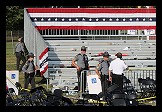 Evidence Fails to Establish Attempted Trump Assass-ination Politically Motivated
Evidence Fails to Establish Attempted Trump Assass-ination Politically Motivated Former MAGA 'Cultist' on the State of the Race for 'MAGA Americans': 'BradCast' 7/23/24
Former MAGA 'Cultist' on the State of the Race for 'MAGA Americans': 'BradCast' 7/23/24  'Green News Report' 7/23/24
'Green News Report' 7/23/24
 Biden Out, Endorses
Biden Out, Endorses BIDEN DROPS REELECTION BID
BIDEN DROPS REELECTION BID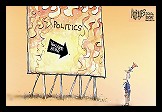 Sunday 'You Are Here' Toons
Sunday 'You Are Here' Toons What J.D. Vance Forgot to Tell You (and Lied About) at the RNC: 'BradCast' 7/18/24
What J.D. Vance Forgot to Tell You (and Lied About) at the RNC: 'BradCast' 7/18/24 'Green News Report' 7/18/24
'Green News Report' 7/18/24 Holding on for Dear Life Amid the Political Whirlwind: 'BradCast' 7/17/24
Holding on for Dear Life Amid the Political Whirlwind: 'BradCast' 7/17/24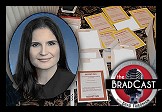 Cannon's Corruption: 'BradCast' 7/16/24
Cannon's Corruption: 'BradCast' 7/16/24 'Green News Report' 7/16/24
'Green News Report' 7/16/24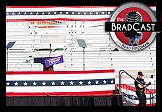 Amid the Assassination Attempt Aftermath:
Amid the Assassination Attempt Aftermath:
 Meanwhile... : 'BradCast' 7/11/24
Meanwhile... : 'BradCast' 7/11/24 'Green News Report' 7/11/24
'Green News Report' 7/11/24 Paging 'Johnny Unbeatable'! Dems (Actually!) in Disarray!: 'BradCast' 7/10/24
Paging 'Johnny Unbeatable'! Dems (Actually!) in Disarray!: 'BradCast' 7/10/24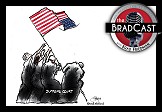 SCOTUS Immunity Ruling 'As Bad as it Sounds', And Worse: 'BradCast' 7/9/24
SCOTUS Immunity Ruling 'As Bad as it Sounds', And Worse: 'BradCast' 7/9/24 So, What Now?: 'BradCast' 7/8/24
So, What Now?: 'BradCast' 7/8/24 Debunking MAGA Cult Xenophobia
Debunking MAGA Cult Xenophobia A Friendly Suggestion: Harris-Newsom 2024
A Friendly Suggestion: Harris-Newsom 2024 Prosecutor: SCOTUS Corruption Ruling Less Corrupt Than Appears: 'BradCast' 6/27/24
Prosecutor: SCOTUS Corruption Ruling Less Corrupt Than Appears: 'BradCast' 6/27/24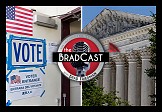 Good News and Bad: At the Polls and From the Corrupted Court: 'BradCast' 6/26/24
Good News and Bad: At the Polls and From the Corrupted Court: 'BradCast' 6/26/24 'Emptywheel' on Assange Hacking, Plea Deal: 'BradCast' 6/25/24
'Emptywheel' on Assange Hacking, Plea Deal: 'BradCast' 6/25/24
 VA GOP VOTER REG FRAUDSTER OFF HOOK
VA GOP VOTER REG FRAUDSTER OFF HOOK Criminal GOP Voter Registration Fraud Probe Expanding in VA
Criminal GOP Voter Registration Fraud Probe Expanding in VA DOJ PROBE SOUGHT AFTER VA ARREST
DOJ PROBE SOUGHT AFTER VA ARREST Arrest in VA: GOP Voter Reg Scandal Widens
Arrest in VA: GOP Voter Reg Scandal Widens ALL TOGETHER: ROVE, SPROUL, KOCHS, RNC
ALL TOGETHER: ROVE, SPROUL, KOCHS, RNC LATimes: RNC's 'Fired' Sproul Working for Repubs in 'as Many as 30 States'
LATimes: RNC's 'Fired' Sproul Working for Repubs in 'as Many as 30 States' 'Fired' Sproul Group 'Cloned', Still Working for Republicans in At Least 10 States
'Fired' Sproul Group 'Cloned', Still Working for Republicans in At Least 10 States FINALLY: FOX ON GOP REG FRAUD SCANDAL
FINALLY: FOX ON GOP REG FRAUD SCANDAL COLORADO FOLLOWS FLORIDA WITH GOP CRIMINAL INVESTIGATION
COLORADO FOLLOWS FLORIDA WITH GOP CRIMINAL INVESTIGATION CRIMINAL PROBE LAUNCHED INTO GOP VOTER REGISTRATION FRAUD SCANDAL IN FL
CRIMINAL PROBE LAUNCHED INTO GOP VOTER REGISTRATION FRAUD SCANDAL IN FL Brad Breaks PA Photo ID & GOP Registration Fraud Scandal News on Hartmann TV
Brad Breaks PA Photo ID & GOP Registration Fraud Scandal News on Hartmann TV  CAUGHT ON TAPE: COORDINATED NATIONWIDE GOP VOTER REG SCAM
CAUGHT ON TAPE: COORDINATED NATIONWIDE GOP VOTER REG SCAM CRIMINAL ELECTION FRAUD COMPLAINT FILED AGAINST GOP 'FRAUD' FIRM
CRIMINAL ELECTION FRAUD COMPLAINT FILED AGAINST GOP 'FRAUD' FIRM RICK SCOTT GETS ROLLED IN GOP REGISTRATION FRAUD SCANDAL
RICK SCOTT GETS ROLLED IN GOP REGISTRATION FRAUD SCANDAL VIDEO: Brad Breaks GOP Reg Fraud Scandal on Hartmann TV
VIDEO: Brad Breaks GOP Reg Fraud Scandal on Hartmann TV RNC FIRES NATIONAL VOTER REGISTRATION FIRM FOR FRAUD
RNC FIRES NATIONAL VOTER REGISTRATION FIRM FOR FRAUD EXCLUSIVE: Intvw w/ FL Official Who First Discovered GOP Reg Fraud
EXCLUSIVE: Intvw w/ FL Official Who First Discovered GOP Reg Fraud GOP REGISTRATION FRAUD FOUND IN FL
GOP REGISTRATION FRAUD FOUND IN FL


































